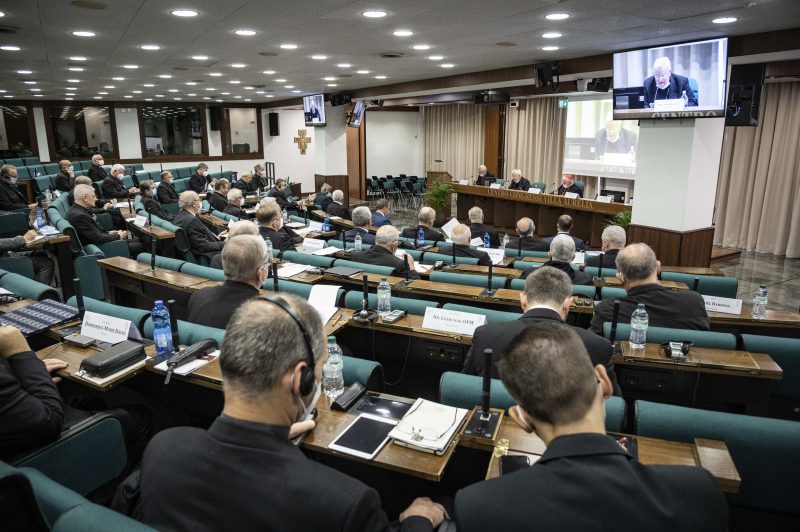The second day of the CCEE Plenary Assembly opened with a greeting from Cardinal Gualtiero Bassetti, President of the Italian Bishops’ Conference. Outlining the prospects for a new Europe, the President of the Italian Episcopal Conference said that he dreamt of a Europe based on solidarity, with the dignity of the person at its centre, and which knows how to be a common home. “This continent,” Cardinal Bassetti hoped, will be “above all a place of the soul with a profound, ancient and complex history”.
In his address, Cardinal Peter Erdö, former president of CCEE, highlighted the CCEE’s great mission, namely “to establish a forum of fraternal charity, where we can exchange our experiences, study developments that are vitally important, at least in some areas, strengthen each other in the same faith, listen to the joy and suffering of our confrères and seek to help according to our own abilities.”
The challenge for the European Bishops, indicated by Cardinal Marc Ouellet, Prefect of the Congregation for Bishops, in his speech is that of “offering our faithful, and the suffering humanity of our times, an understanding of man originating precisely from the Trinitarian mystery in its entire broad formulation; a vision filled with hope that so far has been almost held back or concealed out of little enthusiasm for the enlightening power of God’s word”. To encourage, stimulate and confirm the tasks facing the Bishops, “Our evangelising mission will thus be able to bring forth a new attractive culture – added Cardinal Ouellet – made of social and political friendship, artistic and educational creativity and also multiple passionate vocations for universal fraternity.”
Archbishop Stanisław Gądecki, CCEE Vice-President, read the prologue of Cardinal President Angelo Bagnasco, absent due to a positive Covid-19 test. The President highlighted the challenges facing Europe. “To announce Jesus is the truest and most urgent answer to the many existing challenges, and the best way of serving Europe and the world” emphasised Card. Bagnasco. One of the serious issues facing European countries is “the manipulation of man”, making him a subject of consumption and an object of power. “‘Trans humanism’, which is now discussed and written about, – added the CCEE President – is not an abstract category that is the object of dissertations, but rather an ongoing phenomenon”. The invitation is one to look at a Europe “becoming more and more united from the Atlantic to the Urals. The Continent is a single body, it was born as one and has continued – thanks first and foremost to the Christian presence – to breathe in the original nourishment that is the Gospel in the fruitful meeting of faith and reason: without this virtuous relationship everything becomes complex, and sincere dialogue too comes to lack its required instruments.”
In his address, Cardinal Pietro Parolin, the Vatican Secretary of State, proposed ten areas that the European Churches are called upon to address together: formation; fraternal charity; support for families; defence of human life; new generations; attention to the weak and the poor; migrants; Christian unity; care for the environment and peace. The most urgent priority – stated Card. Parolin – is the transmission of the faith to the new generations. The Church must find ways and languages to educate today’s youth in the faith. The Secretary of State called for forward-looking policies to support the family “which deserve a front row seat in the hearts of your pastoral care and activities. The Church must create and promote the Christian family, from which life will then come, grow and develop, bearing fruits for the whole of humanity”. He then called on the whole Church to take part in the upcoming synodal journey: Communion, participation and mission are the three pillars on which the Synod will be centred. “These are the three coordinates for your mission as pastors in Europe, called-upon to support one another reciprocally in communion, to bear witness to the presence of the Lord in all aspects of our continent’s life” ever more distant from its history and roots. Card. Pietro Parolin also appealed against the “culture of death”, that it does not come to dominate Europe’s legislative landscape completely. “The Churches in Europe should reciprocally support one another in affirming the Gospel of life against the many, far too many announcements of death that echo across the continent”. Finally, he offered a reminder of Europe’s responsibility to build a world of peace. Peace must become “an art that involves and concerns us all and each must play his or her part, in a task that knows no end” concluded the Secretary of State.
Among the speakers on the second day was Professor Isabel Capeloa Gil, Rector of the Catholic University of Portugal and President of FIUC, the International Federation of Catholic Universities, who provided the participants with a cultural analysis on “What Europe Expects from the Church”. “Christianity and Europe should be reaffirmed”, she started. Stressing that the family is the crux of society, Professor Gil dwelt on the role of women in society and how much this continent needs immediate ethical reconstruction. “Europe is no longer ‘the’ world. Women are thought leaders, They are also essential to move the work of the Church forward and they need to be trusted and recognized, “do not let the will, the talent and the service of women go to waste” concluded the Rector of the Portuguese Catholic University.
Attached are the texts of all the day’s speeches.

